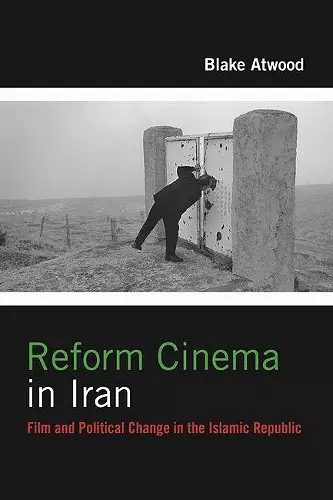Reform Cinema in Iran
Film and Political Change in the Islamic Republic
Format:Paperback
Publisher:Columbia University Press
Published:6th Dec '16
Should be back in stock very soon

It is nearly impossible to separate contemporary Iranian cinema from the Islamic revolution that transformed film production in the country in the late 1970s. As the aims of the revolution shifted and hardened once Khomeini took power and as an eight-year war with Iraq dragged on, Iranian filmmakers confronted new restrictions. In the 1990s, however, the Reformist Movement, led by Mohammad Khatami, and the film industry, developed an unlikely partnership that moved audiences away from revolutionary ideas and toward a discourse of reform. In Reform Cinema in Iran, Blake Atwood examines how new industrial and aesthetic practices created a distinct cultural and political style in Iranian film between 1989 and 2007. Atwood analyzes a range of popular, art, and documentary films. He provides new readings of internationally recognized films such as Abbas Kiarostami's Taste of Cherry (1997) and Mohsen Makhmalbaf's Time for Love (1990), as well as those by Rakhshan Bani, Masud Kiami, and other key Iranian directors. At the same time, he also considers how filmmakers and the film industry were affected by larger political and religious trends that took shape during Mohammad Khatami's presidency (1997-2005). Atwood analyzes political speeches, religious sermons, and newspaper editorials and pays close attention to technological developments, particularly the rise of video, to determine their role in democratizing filmmaking and realizing the goals of political reform. He concludes with a look at the legacy of reform cinema, including films produced under Mahmoud Ahmadinejad, whose neoconservative discourse rejected the policies of reform that preceded him.
Keenly aware of the collaboration between postcolonial cinemas and political movements, Atwood explores the Iranian film industry of the 1980s and 90s. Reform Cinema in Iran vividly reveals how Iranian films of that era and new digital technologies that captured them, participated in the definition of democracy, human rights, and civil society in Iran, thereby supplanting the revolutionary rhetoric of resistance and imperialism that had swept the nation a decade earlier. -- Negar Mottahedeh, Duke University From mysticism to music videos Blake Atwood's Reform Cinema in Iran gives us a comprehensive and alternative lens to understand recent Iranian film. It is an important book for students and lovers of Iranian cinema. -- Roxanne Varzi, University of California, Irvine In Reform Cinema in Iran, Atwood masterfully captures the complex and paradoxical relations between filmmaking and the desire for reconfigurations of the revolution's objectives. Particularly significant is his analysis of how film as a medium and new technologies of representation were instrumental in setting the terms of the reform movement. An important contribution to the study of Iranian cinema and contemporary Iran's cultural production. -- Nasrin Rahimieh, University of California, Irvine Reform Cinema is not only an essential book for institutions that teach Iranian cinema, but also a very valuable source for those studying the reform movement's place in Iranian history. Film International
ISBN: 9780231178174
Dimensions: unknown
Weight: unknown
280 pages